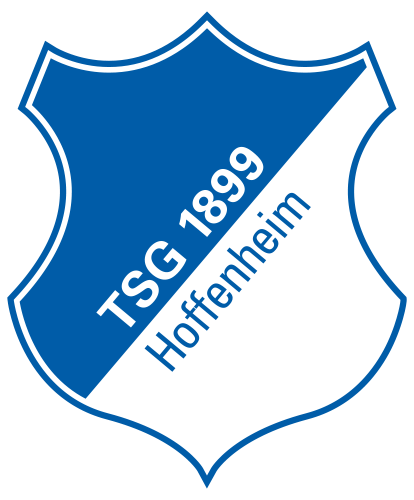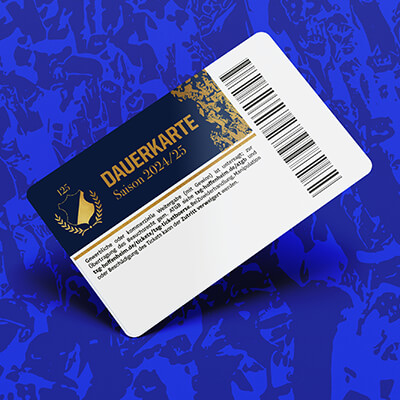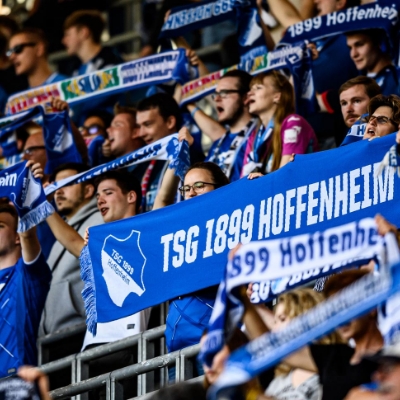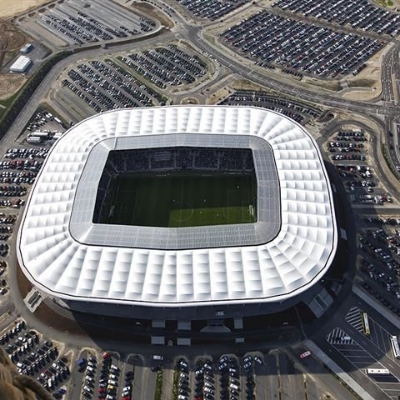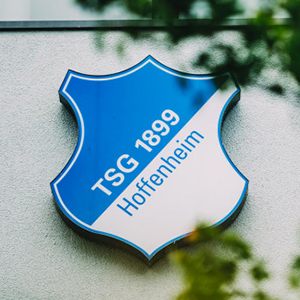Kadeřábek: "I always wanted to stay in Hoffenheim"
Pavel, you've been at TSG for almost a decade but you probably haven't had a six-month period here like the last one. How do you view pre-season and the start to the campaign?
"It is very difficult to assess the true potential of the team this season. We've brought in a lot of new players, almost all of them very late on. In addition – and this is no secret – it was very unsettling in pre-season and now Grischa (editor's note: Prömel) has sustained an injury too. We've tried to factor these things out, got through in the cup and beat Kiel. In a situation like this, you have to stick together and play with a clear head as best you can. If you can do that, what's going on around you does not have an influence on performance."
What's your take on the upheaval within the team?
"It has not been so easy for me personally that many players whom I played alongside for a long time have left over the course of the last one or two years. Friendships developed, we experienced a lot together and suddenly they are no longer there. But that's the way football is. New lads have arrived in their place. It will certainly take a while until everyone is integrated; you simply need a little patience on the pitch and in the changing room for that. It's a big challenge as you actually never have time in football. We all stay calm and focused together. Then I'm sure that we'll play better football and pick up better results. We all want that."
Your personal role has changed somewhat. You're currently a player but also a translator and local tour guide...
(laughs) "That's true. It's almost a little funny that so many Czechs have suddenly arrived in the season at the end of which my contract expires. For nine years, I said to Alex Rosen: ‘Why don't you bring in one of my countrymen?' That never happened and now there are four of us. I'm delighted that they're here and I'm doing everything I can to help them settle in quickly. For that to succeed, I am having to do a lot of translation – especially now at the beginning. But in addition to the advantages, there are negative aspects too. On the one hand, I actually have to concentrate on my own work on the pitch. On the other hand, I sometimes feel bad for the other players when we speak so much Czech, because I've only ever spoken German for my nine years here."
There are also many discussions in football about the supposed formation of cliques within teams. Do the different languages contribute to this?
"It's more down to attitude than language. When we had a lot of French-speaking players here, I used to say in passing: ‘Speak German, please!' That's another reason why I now feel uncomfortable speaking Czech with the three lads. Oli Baumann noticed it recently; he knows me very well. I keep it that way in my private life too: When I'm at the playground with my daughter, I speak to her in German so that everyone understands what we're saying and nobody thinks we're casting aspersions or hiding something. Mutual respect is very important to me and language plays a big role in this. In addition, it does us all good when the same players do not always sit together at meals. If everyone talks to everyone, that has advantages on the pitch and for our success as a team."
Do you try to set an example for your compatriots that they have to learn German quickly in order to be able to integrate as well as possible and enjoy everything?
"Of course. But they honestly have it easier than I did back then. When I joined TSG, all the players spoke German. I had to learn the language to communicate. If the lads don't understand something today, I immediately notice them looking to me for help. Of course, I'm not the kind of person who says: ‘Sort it out yourself’. They're great lads and TSG will have a lot of joy with them in the future – and for now they have a six-month settling-in period. (laughs) But then things should start to work out. I'm very confident; they now have a language teacher and will start to understand more and more."
Apart from the language, do you realise that nine years in Germany have changed you?
Definitely, I now have a lot of German traits. Germany has given me a great deal. I've always been disciplined, but I've developed that even further here. For example, I don't like it at all when someone is not punctual. That can always happen, but then you have to apologise and do better the next time. I'm very German in that regard, also when it comes to commitment. I can't stand it when someone only moves their eyes and does the bare minimum. You always have to go for it on the pitch."
You've already mentioned that your contract ends in 2025 as it stands. After the transfers, did you ever think that TSG wanted to say to you: ‘Hey Pavel, we've brought you some Czechs now, so you don't need to go back yet, why don't you stay here?'
"You could get that impression (laughs). I still have a contract, then we'll see. If TSG approach me, I will of course be very open. But I can also imagine returning to Czechia after such a long time abroad with my family. It would honestly feel weird to play for another club in Germany. But for me, the most important thing for the moment is to produce top performances. If I play a role that is important to me, then we can talk about a contract extension even at the age of 33. But that's rarely the case at TSG. I had a look – Oli Baumann is the only player who has been given a new contract at this age. So for now, I want to enjoy the season as if it were my last."
You turned 32 in April. Are you feeling your age now?
"I honestly don't notice it at all. I actually feel better than I did two or three years ago, when I was injured more often. Of course, I now have to do a bit more for my body and may need more strength training and regeneration. But I started doing that some time ago and it has helped me a lot. I don't feel like a 32-year-old grandad. I feel I can help the team. I've always said that if I realise that nobody wants to play with me in training matches, I'll stop. But everyone still likes having me on their team."
16-year-olds now train with TSG, teenagers are part of the first-team team squad. In that regard, do you sometimes feel that you belong to the older generation?
"Definitely. When David (editor's note: Jurásek) joined us in January, he wrote me a message and greeted me formally. At first I thought he was taking the mickey, but he was serious. It made me feel a bit older and I told him what's what (smiles). In general, you can see the change in football in the young players. Everything is faster, the boys are already incredibly dynamic at 16, 17. But you can still beat them with experience (laughs)."
For a long time, people had the feeling that you had no rivals in your position at TSG. Now Valentin Gendrey has been signed. Would you have preferred to remain without an alternative candidate or do you feel that it's good to have someone else for the position as you compete on three fronts?
"It's important for me to emphasise that this impression is wrong. I've always had competitors, players such as Felix Passlack, Jeremy Toljan or Joshua Brenet. But I've proven to every coach, 'Pavel is stronger, Pavel has to play' and I have asserted myself. I shall pursue this goal this season too. I want to show that I am the best person for my position."
After all these years, is there still a big objective that you want to achieve with TSG?
"That's not so easy, because I've achieved almost everything possible with the club. We've finished third, I've played in the Champions League and Europa League, scored goals in both competitions, plus my emotional goal against Dortmund. It's difficult to achieve more in the Bundesliga because of the competition. But I would of course absolutely love to make significant progress in the DFB-Pokal and play in a semi-final or a final. That is a matter close to all of our hearts; for that to happen, we will also need a bit of luck in the draw. Apart from that, my main goals are: Stay healthy, play well and a lot, stick together as a team – then we can remain successful and achieve something that nobody expects."
You're part of the leadership group. It's noticeable that the players who have been here for many years and are on the Team Council tend to be quieter types...
"You really have to emphasise that we don't have any bad eggs. Everyone helps their team-mates and does everything they can to achieve success; no one withdraws in a huff if they don't play. There are also real friendships in this team."
How do you deal with it when someone gets seriously injured, like Grischa did recently?
"When I saw the incident, I had to take a few steps back. I heard a crack and had tears in my eyes. It's even more upsetting when you get on so well. But it shows you what's really important: Sometimes you get far too angry about the little things or argue about little things – whether in football or in your private life. After a situation like that, you are reminded that you have to enjoy life when you're doing well. I think many people here understand that. That's why we have such a good dressing room. We shout at each other at half-time, but we stick together on and off the pitch. That's why I feel so comfortable here; the atmosphere in the dressing room has always been great."
That's probably why many players have remained loyal to TSG for so long – despite prominent enquiries. You had an offer from AS Roma, Andrej Kramarić from FC Bayern. Much to the delight of your team-mates and fans, you're still here. In your early 30s, do you still think about the fact that you would have liked to have experienced something else?
"I've never really had this feeling before. First and foremost, I am very, very thankful for my nine years in Hoffenheim. In addition, you never know how it would have gone in Rome. At some point, I will be able to say: 'I was at TSG for 10 years, always played, was always valued and became a club legend.' I'm the player with the fourth-most competitive appearances for TSG and I'm sixth in terms of assists, just behind Firmino and Volland. I like looking at the statistics. It feels good to have overtaken another TSG legend. But it's slowly getting more difficult because Oli and Andrej are still playing (laughs). I've achieved statistics at a top club that only a few players can match. That's why I would never say that I have any regrets. I'm really totally happy with what I've achieved at and with TSG. I recently told journalists from Czechia the same thing."
Did they have the feeling you had been here too long?
"No, but Roma are a big club and people naturally ask whether I could have achieved more. My answer is always: ‘What does more mean?' For me, you cannot have more than what I have here. You don't always need even more. If you're satisfied here, you don't need to go to England or Italy. I would like to achieve my goals in my career – and not those of other people. I'm Pavel, I can decide for myself and I always wanted to stay in Hoffenheim. That's why I'm still here. And the same goes for Andrej, by the way."
There is still a core of players who – a brief spell elsewhere aside – have formed the backbone of the team for the last eight or nine years. That's very special. Are players like you, Oliver Baumann, Florian Grillitsch, Dennis Geiger and Andrej Kramarić the ones the other players listen to?
"That's the way it is; we are also on the Team Council along with Kevin Akpoguma and Grischa Prömel, who already played for TSG in the academy and have known the club forever. You can tell that everyone listens when someone from this group says something. On the other hand, we are also the ones who have to intervene if something goes wrong."
A task that Andrej often takes on. Apart from his goals, is he also so important for the team because he is someone who sometimes speaks up internally or publicly about things he doesn't like?
"I'm more of a quiet type and don't like to argue. Andrej always says what he thinks and that's very good for us. In certain situations, you need a character like that who brings emotions into it – that makes an impact and things can be changed. We are different characters, but we get on very well."
But after all these years, you still get mixed up sometimes...
(laughs) "Yes, it's actually incredible. Just the other day I was in the Fan Shop – I hope I'm allowed to say this – and wanted to buy a shirt for my father for his 60th birthday. I was greeted really nicely – "Nice of you to come" – and said that I wanted a shirt with my name and the No. 60 on it. Then everything was done. And when I looked at the shirt, it said: 'Kramarić 60'. I laughed a lot and called him straightaway. I've also been greeted before with "Hello Andrej". In return, he has often been asked to sign a picture of me. We both take it with humour and will probably have to stay here a little longer so that everyone can tell us apart (laughs)."
When your career ends at some point – whether it's at TSG or somewhere else – would you like to stay involved in football?
"That's still very difficult to judge at the moment. My idea is more that I don't want to have anything more to do with the professional business and its rhythm after my career. At some point, you get tired of staying in hotels and want to enjoy a weekend with your family. That's not possible in the professional business, because even as a coach, manager or scout you're on duty at weekends. That's why I'm currently leaning towards doing something completely different."
Becoming a German teacher for example.
(laughs) "That would be an option, I'm already working on it after all."


